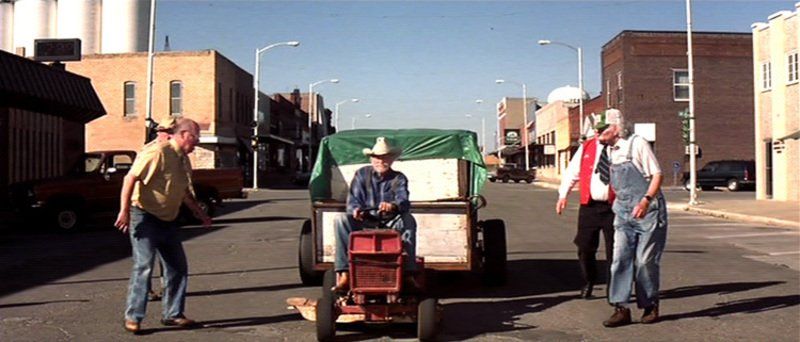My favorite director is Paul Thomas Anderson. He is the auteur of some of my favorite films, including my absolute favorite, Boogie Nights. Or he was. Or he is. I don’t know and yet I wrestle with the idea daily. It’s of small consequence, yes, but I find the desire to declare a favorite and best a good mental check in for where I am in life.
In high school, as I was diving deeper into my love of film, it was Tarantino and George Romero that laid claim as my favorites. In April 2007 my favorite film at the time, Grindhouse, was released. I mark that as one of my favorite film going experiences and will defend Death Proof to this day. But will claim none of that as favorites anymore. My love of PTA hasn’t diminished, but at the moment, am finding two other directors speaking more directly to me. Can favorites change? Of course, but more interestingly, what is it saying about my current tastes?

It’s a three way tie at the top, PTA is still up there, but he is being met and surpassed by the likes of Steven Soderbergh and David Lynch.
Soderbergh has been a year-long fascination for me. I’ve been exploring his catalogue and taking deep dives into his lesser known films. We’ve all seen the Oceans films, but what about his first breakthrough, sex, lies, and videotape? I watched that and it instantly became one of my favorites. Or his crime film, The Underneath, a film so forgotten the easiest way to watch it is as a BONUS FEATURE on the Criterion release of his classic coming-of-age film, King of the Hill. I’ve mentioned before that not every Soderbergh film is great, but every single one of them is interesting. I have a chart in a notebook that ranks them:
Soder-GREAT
Soder-GOOD
Soder-MESS
Going around film Twitter a couple of months ago was a tweet pointing out how woke Soderbergh has been and for how long. The dude made High Flying Bird, a film about the power that NBA players can have and how exploitative the league is. That felt relevant in early 2019 and even more so now. High Flying Bird was placed in the Soder-GOOD column. But before that he made Contagion maybe the most prescient movie in recent history (that is a Soder-GREAT for those who are keeping score.) He can rattle off filmed stage plays, Grey’s Anatomy and And Everything is Going Fine while also knocking out audience pleasers like Magic Mike (Soder-GOOD.)

I haven’t had a chance to watch all of his films yet, which speaks both to how many movies he makes and how much I am savoring his catalogue. All of this does not mean that I find anything PTA does any less interesting, but I find myself enjoying what Soderbergh is doing at the moment. He isn’t resting in what he knows, once again, not that PTA is, but is constantly exploring and finding interesting way to tell stories. His psychological-horror film Unsane was shot on iPhones (Soder-GOOD). I find drawn to someone who is playing with the medium, but a part of me also feels drawn to him because he isn’t out there getting Academy Award nominations at every turn. For whatever reason, my brain has always been more attracted to the interesting mess than the perfect four star and I think that is coming to a head with my overwhelming love for everything Soderbergh directs.
Then there is David Lynch. Maybe I’m behind the times. I felt like I should have discovered Lynch in college, but it wasn’t until about six or seven years ago when I binged the original Twin Peaks show that I fell head over heels for him. I love his aesthetic. I love his point of view. I love his tone. I, uh, basically love everything about him. I get him and in turn, while not possible, I feel like his films get ME (Do I sound like a crazy person?)
I went through the hits of his filmography shortly after finishing Twin Peaks. Mulholland Drive blew my mind and is now one of my favorite films. Blue Velvet equally so, but it wasn’t until a couple of years ago when I read his quasi-memoir Room to Dream that I explored his lesser known films and realized how great he truly is.

If you were to ask me on any given day what my favorite Lynch film is, I’d likely say Mulholland Drive or Fire Walk with Me, but there are definitely days where it is The Straight Story. The weirdest of Lynch’s films, because it is the most normal, The Straight Story follows the adventure of an old man crossing the country on a lawn mower to make peace with his dying brother. Some of the Lynchian hallmarks are present, including the humanity that is present in all of his films. What most people don’t understand about Lynch, often distracted by his “weirdness” is that he loves people and his films overflow with his love for people. He finds his love for people in the mundane. He uses the darkness of his films to shine a light on how lovely mundane human nature is. The Straight Story only has implied darkness and an abundance of joy. The joy is found through sorrow, but it is there. Thinking about it brings a smile to my face. This goes for The Elephant Man as well, a film that shows how wonderful humanity can be by exploring some of its darkness.
Lynch like Soderbergh have risen in the ranks of favorites because they don’t rest on any one thing, they can be compared to Kubrick in that regard, bringing something new and interesting to each film. PTA is this as well and why he remains high on my list.
It’s clear my tastes change and lately my interest in mass films has waned significantly. I don’t care about big blockbusters anymore and would much rather take a deep dive into an artistic failure than something widely considered great. If I had the rest of my life to only watch PTA, Lynch, and Soderbergh, I think I’d be ok.
(I understand that I’m talking about three white dudes.)
What a fantastic article. Now I want to re-visit some these movies!
Sent from my iPhone
>
LikeLike